Filter by
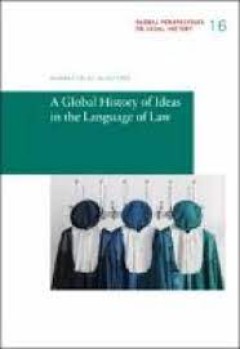
A Global History of Ideas in the Language of Law
This book argues that the narrowing focus of the global history of ideas on narratives in historical research, philosophy and political theory neglects the fact that the central concepts of the history of political ideas are articulated in the language of law. Key figures of the history of ideas, like Kant, Hegel and Weber, engaged deeply with the philosophy and sociology of law. This monograph…
- Edition
- -
- ISBN/ISSN
- 9783944773315
- Collation
- -
- Series Title
- -
- Call Number
- -

Smart Cities in Asia Regulations, Problems, and Development
This open access book examines different aspects of smart cities, including technology, urban development, sustainable development, finance, and privacy and data protection. It also covers a wide range of jurisdictions in Asia-Pacific: Hong Kong, Indonesia, Malaysia, Singapore, Thailand, and Vietnam. The book consists of two main parts. The first part includes general chapters that conceptualiz…
- Edition
- -
- ISBN/ISSN
- 9789811917011
- Collation
- -
- Series Title
- -
- Call Number
- -
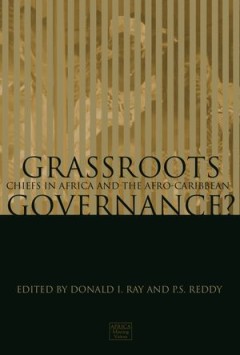
Grassroots Governance? : Chiefs in Africa and the Afro-Caribbean
Traditional leadership is a factor that has long been overlooked in evaluations of rural local government in much of contemporary Sub-Saharan Africa. Grassroots Governance?, an interdisciplinary and intercontinental collection, addresses this gap in African scholarship and brings new perspectives on the integration, or reconciliation, of traditional leadership with democratic systems of local g…
- Edition
- -
- ISBN/ISSN
- 9781552385654
- Collation
- -
- Series Title
- -
- Call Number
- 350 RAY g

Peace Through Law : The Versailles Peace Treaty and Dispute Settlement After …
With the benefit of hindsight, presenting the Treaty of Versailles as an example of ‘peace through law’ might seem like a provocation. And yet, the extreme variety and innovativeness of international procedural and substantial ‘experiments’ attempted as a result of the Treaty of Versailles and the other Paris peace treaties of 1919–1920 remain striking even today. While many of these …
- Edition
- -
- ISBN/ISSN
- 9783845299167
- Collation
- -
- Series Title
- -
- Call Number
- 340 PEA

Migration and Hybrid Political Regimes Navigating the Legal Landscape in Russia
While migration has become a vital issue worldwide, mainstream literature on migrants’ legal adaptation and integration has focused on cases in Western-style democracies. We know relatively little about how migrants adapt in the ever-growing hybrid political regimes that are neither clearly democratic nor conventionally authoritarian. This book takes up the case of Russia—the third largest …
- Edition
- -
- ISBN/ISSN
- 9780520971257
- Collation
- -
- Series Title
- -
- Call Number
- -
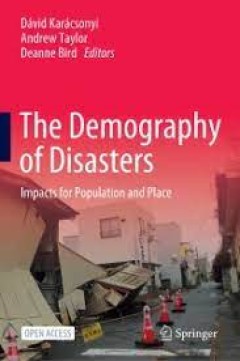
The Demography of Disasters Impacts for Population and Place
This open access book provides worldwide examples demonstrating the importance of the interplay between demography and disasters in regions and spatially. It marks an advance in practical and theoretical insights for understanding the role of demography in planning for and mitigating impacts from disasters in developed nations. Both slow onset (like the of loss polar ice from climate change) an…
- Edition
- -
- ISBN/ISSN
- -
- Collation
- -
- Series Title
- -
- Call Number
- -

Asian Yearbook of International Law, Volume 20 (2014)
The Yearbook aims to promote research, studies and writings in the field of international law in Asia, as well as to provide an intellectual platform for the discussion and dissemination of Asian views and practices on contemporary international legal issues. Readership: All interested in International Law and Asian Law.
- Edition
- -
- ISBN/ISSN
- -
- Collation
- -
- Series Title
- -
- Call Number
- -
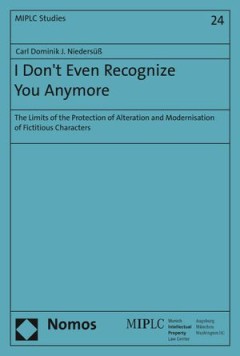
I Don't Even Recognize You Anymore : The Limits of the Protection of Alterati…
In a multitude of ways, fictitious characters are being employed in the marketing of goods: Be it as spokes-characters in advertisement campaigns, or be it by adding substantial value to bulk products in ways of merchandising. Characters are semantic units consisting of name, visual appearance, voice and an underlying scheme of personality traits and experiences. And just by their mere presence…
- Edition
- -
- ISBN/ISSN
- 9783845257143
- Collation
- -
- Series Title
- -
- Call Number
- 650 NIE i
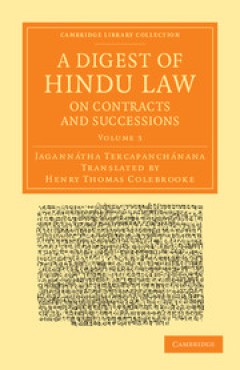
A Digest of Hindu Law, on Contracts and Successions
An honorary professor of Sanskrit and Hindu law at Fort William College in Calcutta, and a key figure in the foundation of the Royal Asiatic Society, Henry Thomas Colebrooke (1765–1837) became Britain's foremost orientalist during the early nineteenth century. Taking up the reins of Sanskrit scholarship following the death of Sir William Jones (1746–94), Colebrooke made several substantial …
- Edition
- -
- ISBN/ISSN
- 9781139519823
- Collation
- -
- Series Title
- Cambridge Library Collection - Perspectives from the Royal Asiatic Society
- Call Number
- -
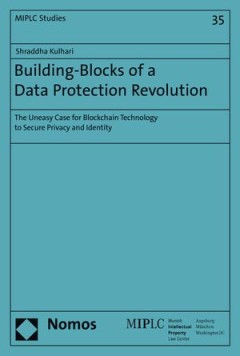
Building-Blocks of a Data Protection Revolution : The Uneasy Case for Blockch…
The General Data Protection Regulation (GDPR) replaced the old and battered Data Protection Directive on 25 May 2018 after a long-drawn reform. The rapidly evolving technological landscape will test the ability of the GDPR to effectively achieve the goals of protecting personal data and the free movement of data. This book proposes a technological supplement to achieve the goal of data protecti…
- Edition
- -
- ISBN/ISSN
- 9783845294025
- Collation
- -
- Series Title
- -
- Call Number
- 340 KUL b
 Computer Science, Information & General Works
Computer Science, Information & General Works  Philosophy & Psychology
Philosophy & Psychology  Religion
Religion  Social Sciences
Social Sciences  Language
Language  Pure Science
Pure Science  Applied Sciences
Applied Sciences  Art & Recreation
Art & Recreation  Literature
Literature  History & Geography
History & Geography